ACAP COUN6191 Research Proposal: Intuition in Life-Changing Decisions
VerifiedAdded on 2022/10/12
|16
|4916
|46
Report
AI Summary
This research proposal, authored by Mariano Tabone for COUN6191 at ACAP, investigates the impact of intuition on life-changing decisions within a counselling context. The study aims to understand how intuition influences client decision-making, particularly in stressful situations, and how it interacts with rational thought, logic, and emotional intelligence. The proposal includes a comprehensive literature review, examining various therapeutic approaches such as Cognitive Behavioral Therapy, Gestalt therapy, Existential therapy, Person-centered therapy, and psychoanalysis, to identify research gaps and establish the significance of intuition in the decision-making process. The research will explore the characteristics of intuition and its role in clinical practice, considering perspectives from prominent figures like Carl Jung, Carl Rogers, and Daniel Kahneman. The study seeks to determine if intuition contributes positively or negatively to the decision-making process and whether it should be considered alongside rational, psychoeducational, or phenomenological influences. The proposal also addresses the need to understand how clients transition from indecisiveness to confidently exploring intuitive decision-making, contributing to the existing body of knowledge in counselling and psychotherapy research.
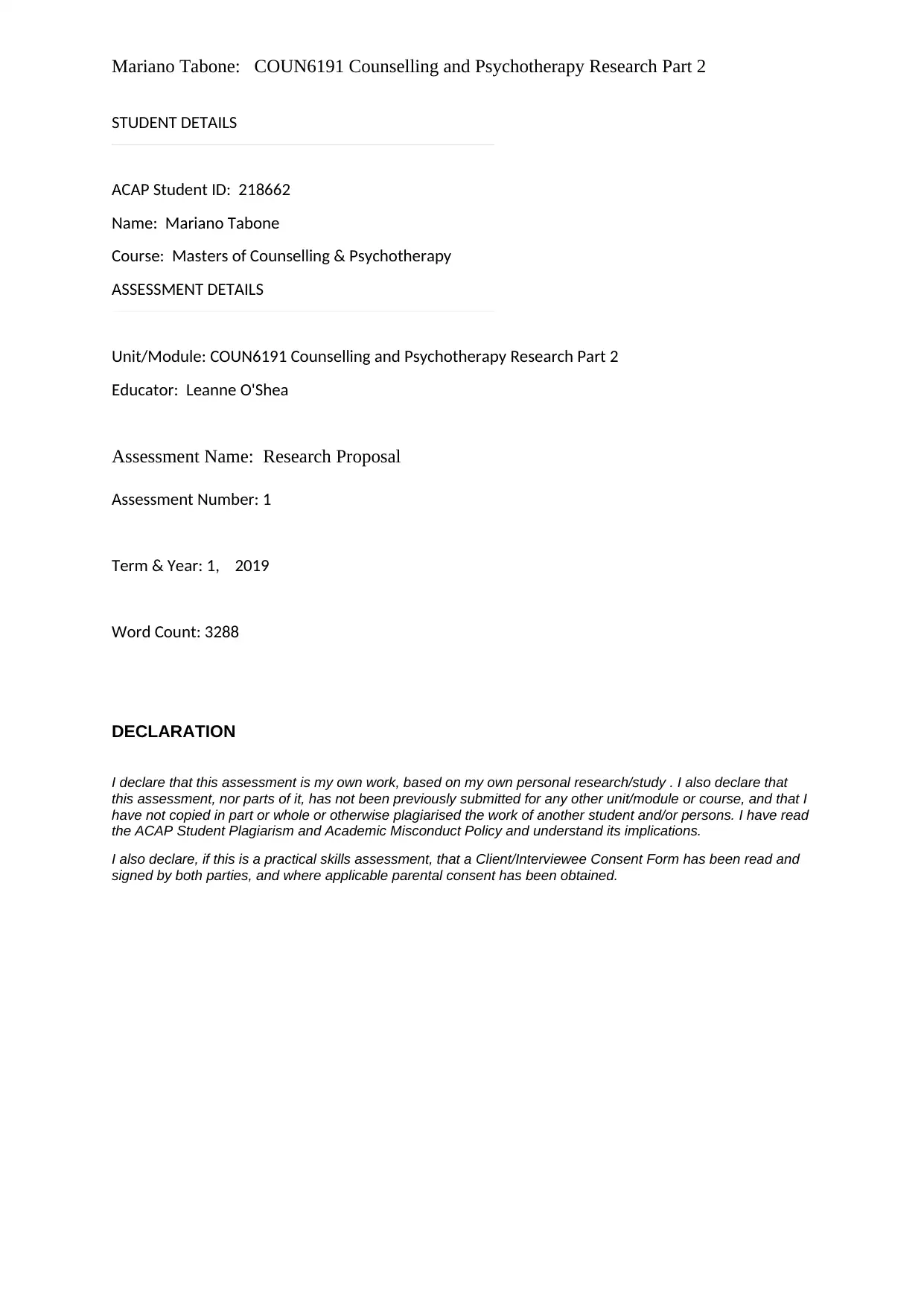
Mariano Tabone: COUN6191 Counselling and Psychotherapy Research Part 2
STUDENT DETAILS
ACAP Student ID: 218662
Name: Mariano Tabone
Course: Masters of Counselling & Psychotherapy
ASSESSMENT DETAILS
Unit/Module: COUN6191 Counselling and Psychotherapy Research Part 2
Educator: Leanne O'Shea
Assessment Name: Research Proposal
Assessment Number: 1
Term & Year: 1, 2019
Word Count: 3288
DECLARATION
I declare that this assessment is my own work, based on my own personal research/study . I also declare that
this assessment, nor parts of it, has not been previously submitted for any other unit/module or course, and that I
have not copied in part or whole or otherwise plagiarised the work of another student and/or persons. I have read
the ACAP Student Plagiarism and Academic Misconduct Policy and understand its implications.
I also declare, if this is a practical skills assessment, that a Client/Interviewee Consent Form has been read and
signed by both parties, and where applicable parental consent has been obtained.
STUDENT DETAILS
ACAP Student ID: 218662
Name: Mariano Tabone
Course: Masters of Counselling & Psychotherapy
ASSESSMENT DETAILS
Unit/Module: COUN6191 Counselling and Psychotherapy Research Part 2
Educator: Leanne O'Shea
Assessment Name: Research Proposal
Assessment Number: 1
Term & Year: 1, 2019
Word Count: 3288
DECLARATION
I declare that this assessment is my own work, based on my own personal research/study . I also declare that
this assessment, nor parts of it, has not been previously submitted for any other unit/module or course, and that I
have not copied in part or whole or otherwise plagiarised the work of another student and/or persons. I have read
the ACAP Student Plagiarism and Academic Misconduct Policy and understand its implications.
I also declare, if this is a practical skills assessment, that a Client/Interviewee Consent Form has been read and
signed by both parties, and where applicable parental consent has been obtained.
Paraphrase This Document
Need a fresh take? Get an instant paraphrase of this document with our AI Paraphraser
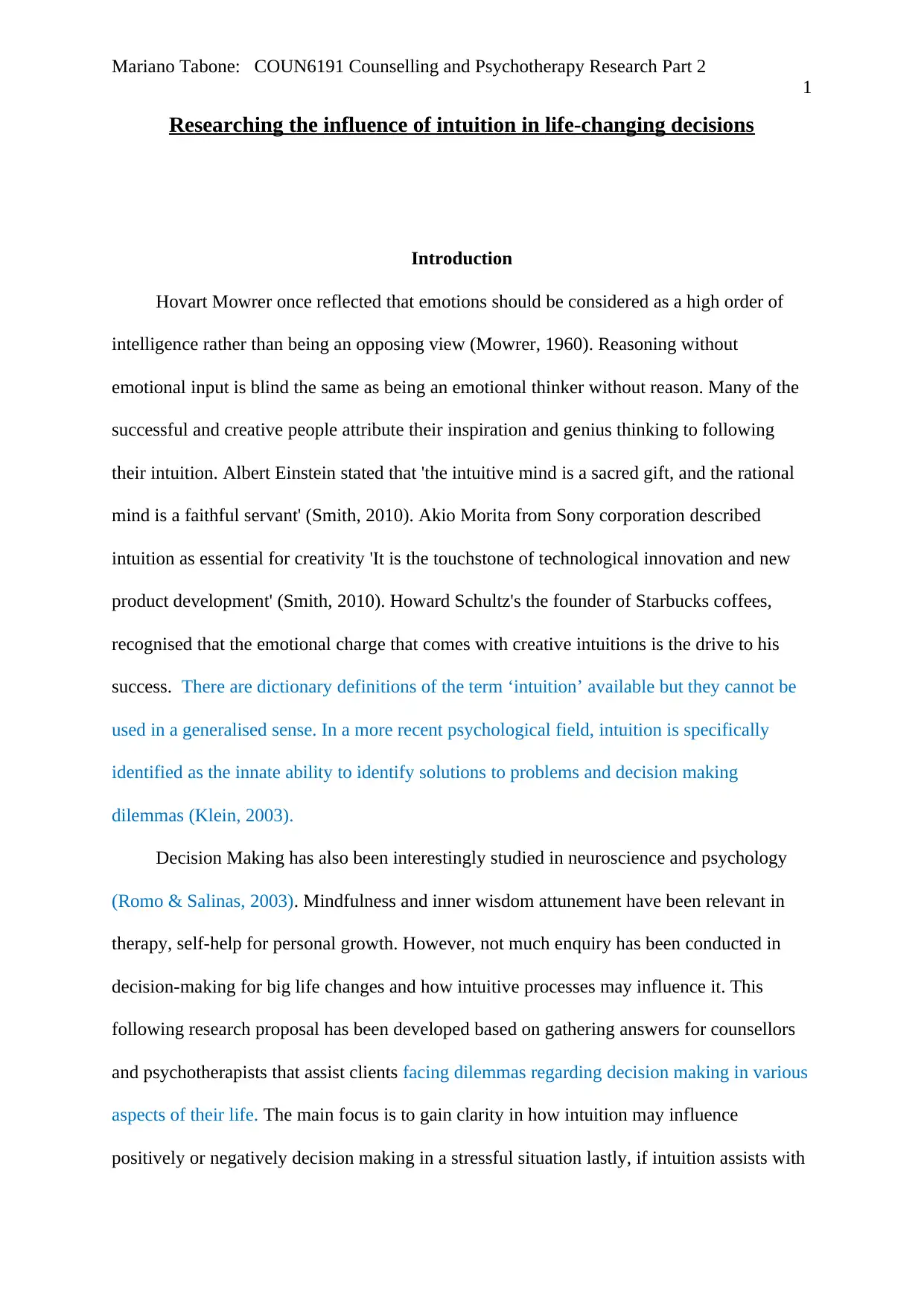
Mariano Tabone: COUN6191 Counselling and Psychotherapy Research Part 2
1
Researching the influence of intuition in life-changing decisions
Introduction
Hovart Mowrer once reflected that emotions should be considered as a high order of
intelligence rather than being an opposing view (Mowrer, 1960). Reasoning without
emotional input is blind the same as being an emotional thinker without reason. Many of the
successful and creative people attribute their inspiration and genius thinking to following
their intuition. Albert Einstein stated that 'the intuitive mind is a sacred gift, and the rational
mind is a faithful servant' (Smith, 2010). Akio Morita from Sony corporation described
intuition as essential for creativity 'It is the touchstone of technological innovation and new
product development' (Smith, 2010). Howard Schultz's the founder of Starbucks coffees,
recognised that the emotional charge that comes with creative intuitions is the drive to his
success. There are dictionary definitions of the term ‘intuition’ available but they cannot be
used in a generalised sense. In a more recent psychological field, intuition is specifically
identified as the innate ability to identify solutions to problems and decision making
dilemmas (Klein, 2003).
Decision Making has also been interestingly studied in neuroscience and psychology
(Romo & Salinas, 2003). Mindfulness and inner wisdom attunement have been relevant in
therapy, self-help for personal growth. However, not much enquiry has been conducted in
decision-making for big life changes and how intuitive processes may influence it. This
following research proposal has been developed based on gathering answers for counsellors
and psychotherapists that assist clients facing dilemmas regarding decision making in various
aspects of their life. The main focus is to gain clarity in how intuition may influence
positively or negatively decision making in a stressful situation lastly, if intuition assists with
1
Researching the influence of intuition in life-changing decisions
Introduction
Hovart Mowrer once reflected that emotions should be considered as a high order of
intelligence rather than being an opposing view (Mowrer, 1960). Reasoning without
emotional input is blind the same as being an emotional thinker without reason. Many of the
successful and creative people attribute their inspiration and genius thinking to following
their intuition. Albert Einstein stated that 'the intuitive mind is a sacred gift, and the rational
mind is a faithful servant' (Smith, 2010). Akio Morita from Sony corporation described
intuition as essential for creativity 'It is the touchstone of technological innovation and new
product development' (Smith, 2010). Howard Schultz's the founder of Starbucks coffees,
recognised that the emotional charge that comes with creative intuitions is the drive to his
success. There are dictionary definitions of the term ‘intuition’ available but they cannot be
used in a generalised sense. In a more recent psychological field, intuition is specifically
identified as the innate ability to identify solutions to problems and decision making
dilemmas (Klein, 2003).
Decision Making has also been interestingly studied in neuroscience and psychology
(Romo & Salinas, 2003). Mindfulness and inner wisdom attunement have been relevant in
therapy, self-help for personal growth. However, not much enquiry has been conducted in
decision-making for big life changes and how intuitive processes may influence it. This
following research proposal has been developed based on gathering answers for counsellors
and psychotherapists that assist clients facing dilemmas regarding decision making in various
aspects of their life. The main focus is to gain clarity in how intuition may influence
positively or negatively decision making in a stressful situation lastly, if intuition assists with
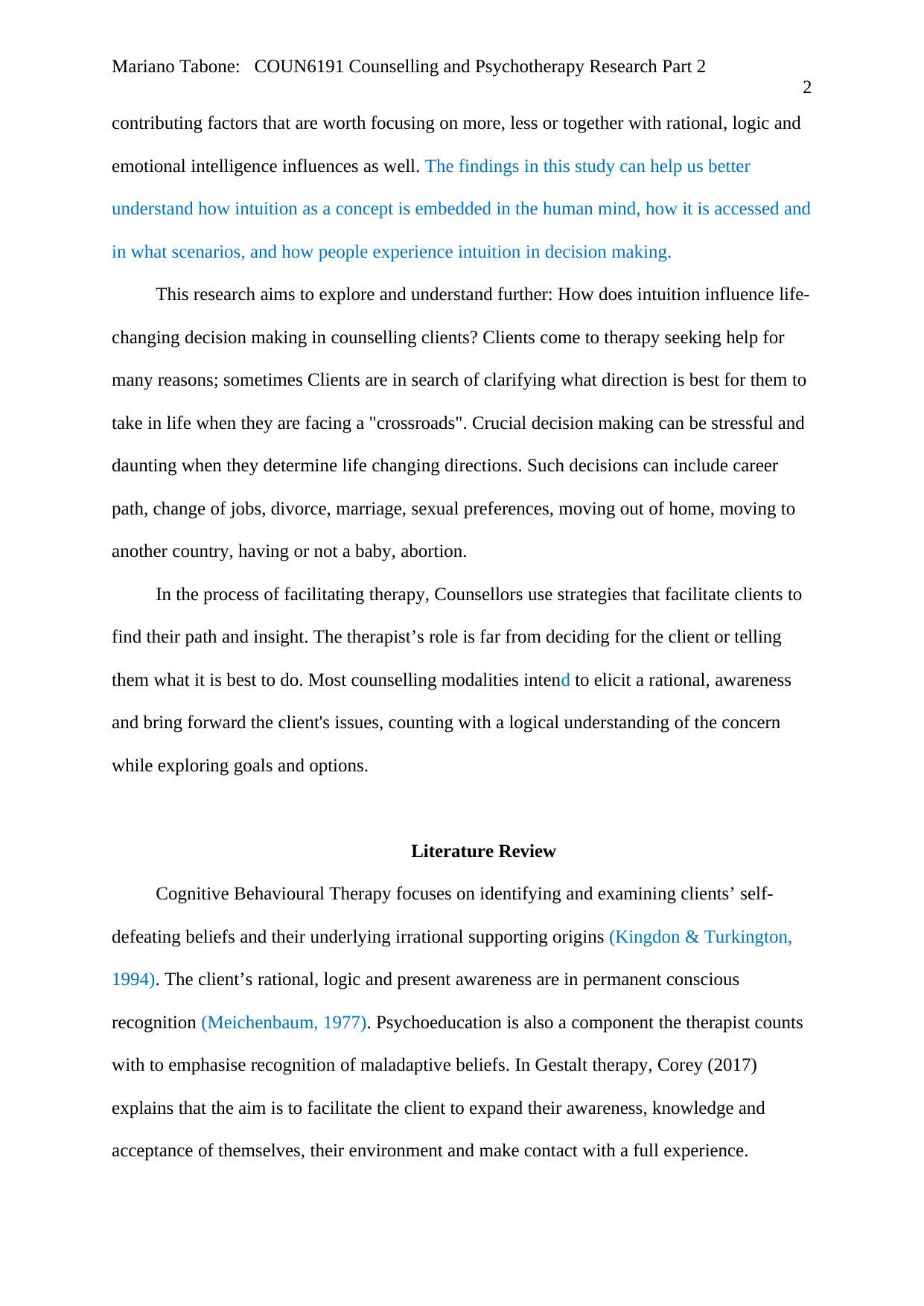
Mariano Tabone: COUN6191 Counselling and Psychotherapy Research Part 2
2
contributing factors that are worth focusing on more, less or together with rational, logic and
emotional intelligence influences as well. The findings in this study can help us better
understand how intuition as a concept is embedded in the human mind, how it is accessed and
in what scenarios, and how people experience intuition in decision making.
This research aims to explore and understand further: How does intuition influence life-
changing decision making in counselling clients? Clients come to therapy seeking help for
many reasons; sometimes Clients are in search of clarifying what direction is best for them to
take in life when they are facing a "crossroads". Crucial decision making can be stressful and
daunting when they determine life changing directions. Such decisions can include career
path, change of jobs, divorce, marriage, sexual preferences, moving out of home, moving to
another country, having or not a baby, abortion.
In the process of facilitating therapy, Counsellors use strategies that facilitate clients to
find their path and insight. The therapist’s role is far from deciding for the client or telling
them what it is best to do. Most counselling modalities intend to elicit a rational, awareness
and bring forward the client's issues, counting with a logical understanding of the concern
while exploring goals and options.
Literature Review
Cognitive Behavioural Therapy focuses on identifying and examining clients’ self-
defeating beliefs and their underlying irrational supporting origins (Kingdon & Turkington,
1994). The client’s rational, logic and present awareness are in permanent conscious
recognition (Meichenbaum, 1977). Psychoeducation is also a component the therapist counts
with to emphasise recognition of maladaptive beliefs. In Gestalt therapy, Corey (2017)
explains that the aim is to facilitate the client to expand their awareness, knowledge and
acceptance of themselves, their environment and make contact with a full experience.
2
contributing factors that are worth focusing on more, less or together with rational, logic and
emotional intelligence influences as well. The findings in this study can help us better
understand how intuition as a concept is embedded in the human mind, how it is accessed and
in what scenarios, and how people experience intuition in decision making.
This research aims to explore and understand further: How does intuition influence life-
changing decision making in counselling clients? Clients come to therapy seeking help for
many reasons; sometimes Clients are in search of clarifying what direction is best for them to
take in life when they are facing a "crossroads". Crucial decision making can be stressful and
daunting when they determine life changing directions. Such decisions can include career
path, change of jobs, divorce, marriage, sexual preferences, moving out of home, moving to
another country, having or not a baby, abortion.
In the process of facilitating therapy, Counsellors use strategies that facilitate clients to
find their path and insight. The therapist’s role is far from deciding for the client or telling
them what it is best to do. Most counselling modalities intend to elicit a rational, awareness
and bring forward the client's issues, counting with a logical understanding of the concern
while exploring goals and options.
Literature Review
Cognitive Behavioural Therapy focuses on identifying and examining clients’ self-
defeating beliefs and their underlying irrational supporting origins (Kingdon & Turkington,
1994). The client’s rational, logic and present awareness are in permanent conscious
recognition (Meichenbaum, 1977). Psychoeducation is also a component the therapist counts
with to emphasise recognition of maladaptive beliefs. In Gestalt therapy, Corey (2017)
explains that the aim is to facilitate the client to expand their awareness, knowledge and
acceptance of themselves, their environment and make contact with a full experience.
⊘ This is a preview!⊘
Do you want full access?
Subscribe today to unlock all pages.

Trusted by 1+ million students worldwide
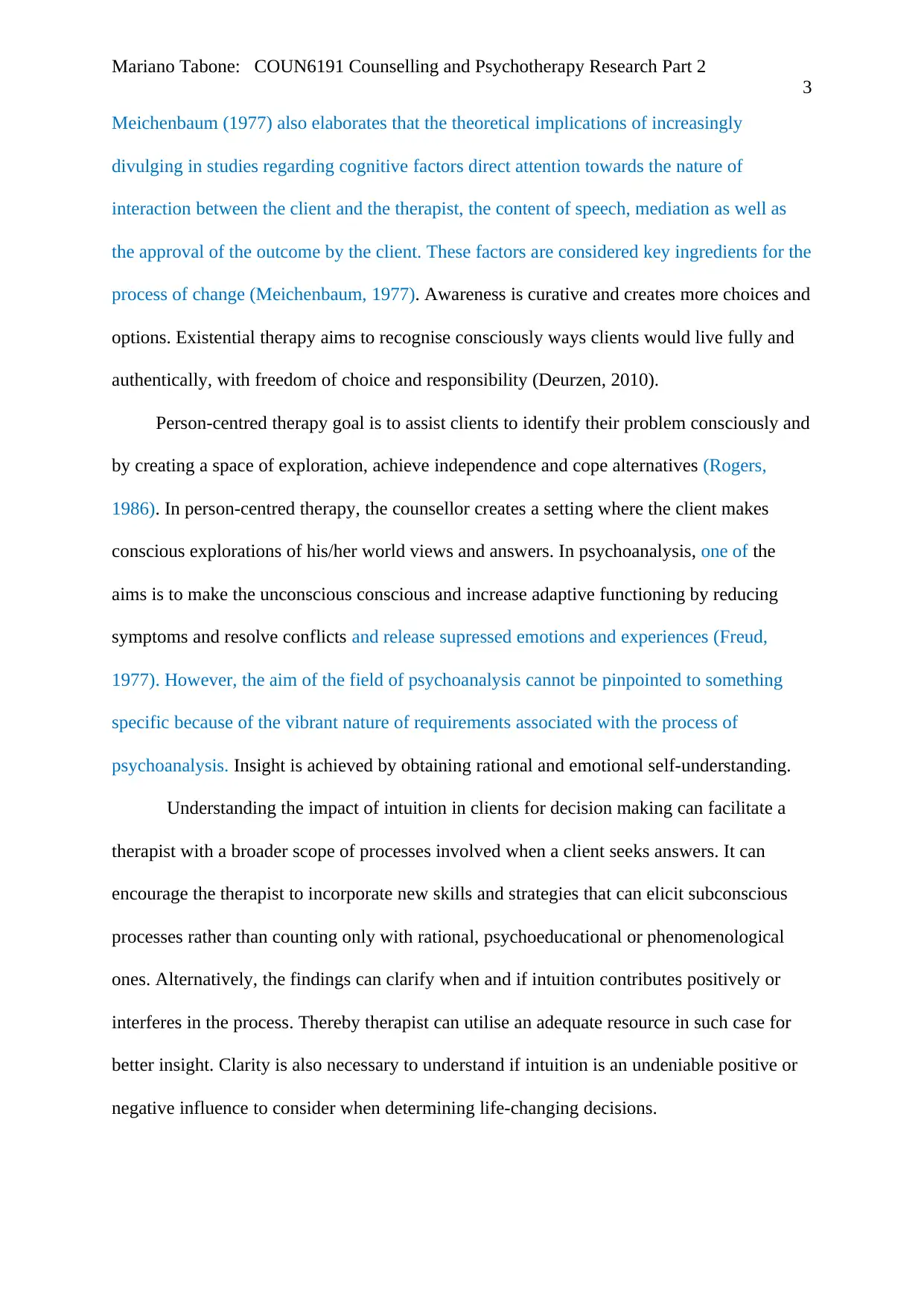
Mariano Tabone: COUN6191 Counselling and Psychotherapy Research Part 2
3
Meichenbaum (1977) also elaborates that the theoretical implications of increasingly
divulging in studies regarding cognitive factors direct attention towards the nature of
interaction between the client and the therapist, the content of speech, mediation as well as
the approval of the outcome by the client. These factors are considered key ingredients for the
process of change (Meichenbaum, 1977). Awareness is curative and creates more choices and
options. Existential therapy aims to recognise consciously ways clients would live fully and
authentically, with freedom of choice and responsibility (Deurzen, 2010).
Person-centred therapy goal is to assist clients to identify their problem consciously and
by creating a space of exploration, achieve independence and cope alternatives (Rogers,
1986). In person-centred therapy, the counsellor creates a setting where the client makes
conscious explorations of his/her world views and answers. In psychoanalysis, one of the
aims is to make the unconscious conscious and increase adaptive functioning by reducing
symptoms and resolve conflicts and release supressed emotions and experiences (Freud,
1977). However, the aim of the field of psychoanalysis cannot be pinpointed to something
specific because of the vibrant nature of requirements associated with the process of
psychoanalysis. Insight is achieved by obtaining rational and emotional self-understanding.
Understanding the impact of intuition in clients for decision making can facilitate a
therapist with a broader scope of processes involved when a client seeks answers. It can
encourage the therapist to incorporate new skills and strategies that can elicit subconscious
processes rather than counting only with rational, psychoeducational or phenomenological
ones. Alternatively, the findings can clarify when and if intuition contributes positively or
interferes in the process. Thereby therapist can utilise an adequate resource in such case for
better insight. Clarity is also necessary to understand if intuition is an undeniable positive or
negative influence to consider when determining life-changing decisions.
3
Meichenbaum (1977) also elaborates that the theoretical implications of increasingly
divulging in studies regarding cognitive factors direct attention towards the nature of
interaction between the client and the therapist, the content of speech, mediation as well as
the approval of the outcome by the client. These factors are considered key ingredients for the
process of change (Meichenbaum, 1977). Awareness is curative and creates more choices and
options. Existential therapy aims to recognise consciously ways clients would live fully and
authentically, with freedom of choice and responsibility (Deurzen, 2010).
Person-centred therapy goal is to assist clients to identify their problem consciously and
by creating a space of exploration, achieve independence and cope alternatives (Rogers,
1986). In person-centred therapy, the counsellor creates a setting where the client makes
conscious explorations of his/her world views and answers. In psychoanalysis, one of the
aims is to make the unconscious conscious and increase adaptive functioning by reducing
symptoms and resolve conflicts and release supressed emotions and experiences (Freud,
1977). However, the aim of the field of psychoanalysis cannot be pinpointed to something
specific because of the vibrant nature of requirements associated with the process of
psychoanalysis. Insight is achieved by obtaining rational and emotional self-understanding.
Understanding the impact of intuition in clients for decision making can facilitate a
therapist with a broader scope of processes involved when a client seeks answers. It can
encourage the therapist to incorporate new skills and strategies that can elicit subconscious
processes rather than counting only with rational, psychoeducational or phenomenological
ones. Alternatively, the findings can clarify when and if intuition contributes positively or
interferes in the process. Thereby therapist can utilise an adequate resource in such case for
better insight. Clarity is also necessary to understand if intuition is an undeniable positive or
negative influence to consider when determining life-changing decisions.
Paraphrase This Document
Need a fresh take? Get an instant paraphrase of this document with our AI Paraphraser
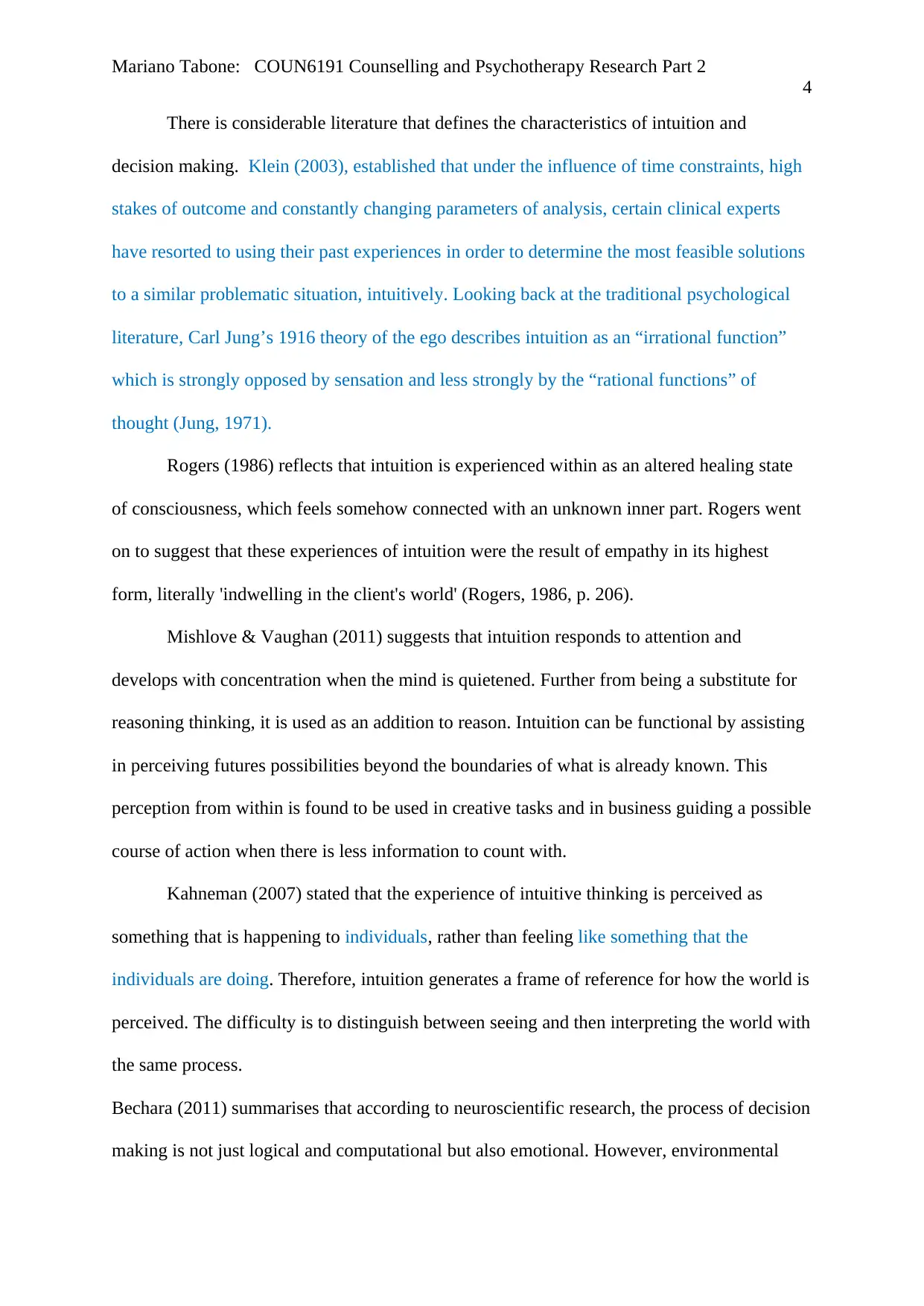
Mariano Tabone: COUN6191 Counselling and Psychotherapy Research Part 2
4
There is considerable literature that defines the characteristics of intuition and
decision making. Klein (2003), established that under the influence of time constraints, high
stakes of outcome and constantly changing parameters of analysis, certain clinical experts
have resorted to using their past experiences in order to determine the most feasible solutions
to a similar problematic situation, intuitively. Looking back at the traditional psychological
literature, Carl Jung’s 1916 theory of the ego describes intuition as an “irrational function”
which is strongly opposed by sensation and less strongly by the “rational functions” of
thought (Jung, 1971).
Rogers (1986) reflects that intuition is experienced within as an altered healing state
of consciousness, which feels somehow connected with an unknown inner part. Rogers went
on to suggest that these experiences of intuition were the result of empathy in its highest
form, literally 'indwelling in the client's world' (Rogers, 1986, p. 206).
Mishlove & Vaughan (2011) suggests that intuition responds to attention and
develops with concentration when the mind is quietened. Further from being a substitute for
reasoning thinking, it is used as an addition to reason. Intuition can be functional by assisting
in perceiving futures possibilities beyond the boundaries of what is already known. This
perception from within is found to be used in creative tasks and in business guiding a possible
course of action when there is less information to count with.
Kahneman (2007) stated that the experience of intuitive thinking is perceived as
something that is happening to individuals, rather than feeling like something that the
individuals are doing. Therefore, intuition generates a frame of reference for how the world is
perceived. The difficulty is to distinguish between seeing and then interpreting the world with
the same process.
Bechara (2011) summarises that according to neuroscientific research, the process of decision
making is not just logical and computational but also emotional. However, environmental
4
There is considerable literature that defines the characteristics of intuition and
decision making. Klein (2003), established that under the influence of time constraints, high
stakes of outcome and constantly changing parameters of analysis, certain clinical experts
have resorted to using their past experiences in order to determine the most feasible solutions
to a similar problematic situation, intuitively. Looking back at the traditional psychological
literature, Carl Jung’s 1916 theory of the ego describes intuition as an “irrational function”
which is strongly opposed by sensation and less strongly by the “rational functions” of
thought (Jung, 1971).
Rogers (1986) reflects that intuition is experienced within as an altered healing state
of consciousness, which feels somehow connected with an unknown inner part. Rogers went
on to suggest that these experiences of intuition were the result of empathy in its highest
form, literally 'indwelling in the client's world' (Rogers, 1986, p. 206).
Mishlove & Vaughan (2011) suggests that intuition responds to attention and
develops with concentration when the mind is quietened. Further from being a substitute for
reasoning thinking, it is used as an addition to reason. Intuition can be functional by assisting
in perceiving futures possibilities beyond the boundaries of what is already known. This
perception from within is found to be used in creative tasks and in business guiding a possible
course of action when there is less information to count with.
Kahneman (2007) stated that the experience of intuitive thinking is perceived as
something that is happening to individuals, rather than feeling like something that the
individuals are doing. Therefore, intuition generates a frame of reference for how the world is
perceived. The difficulty is to distinguish between seeing and then interpreting the world with
the same process.
Bechara (2011) summarises that according to neuroscientific research, the process of decision
making is not just logical and computational but also emotional. However, environmental
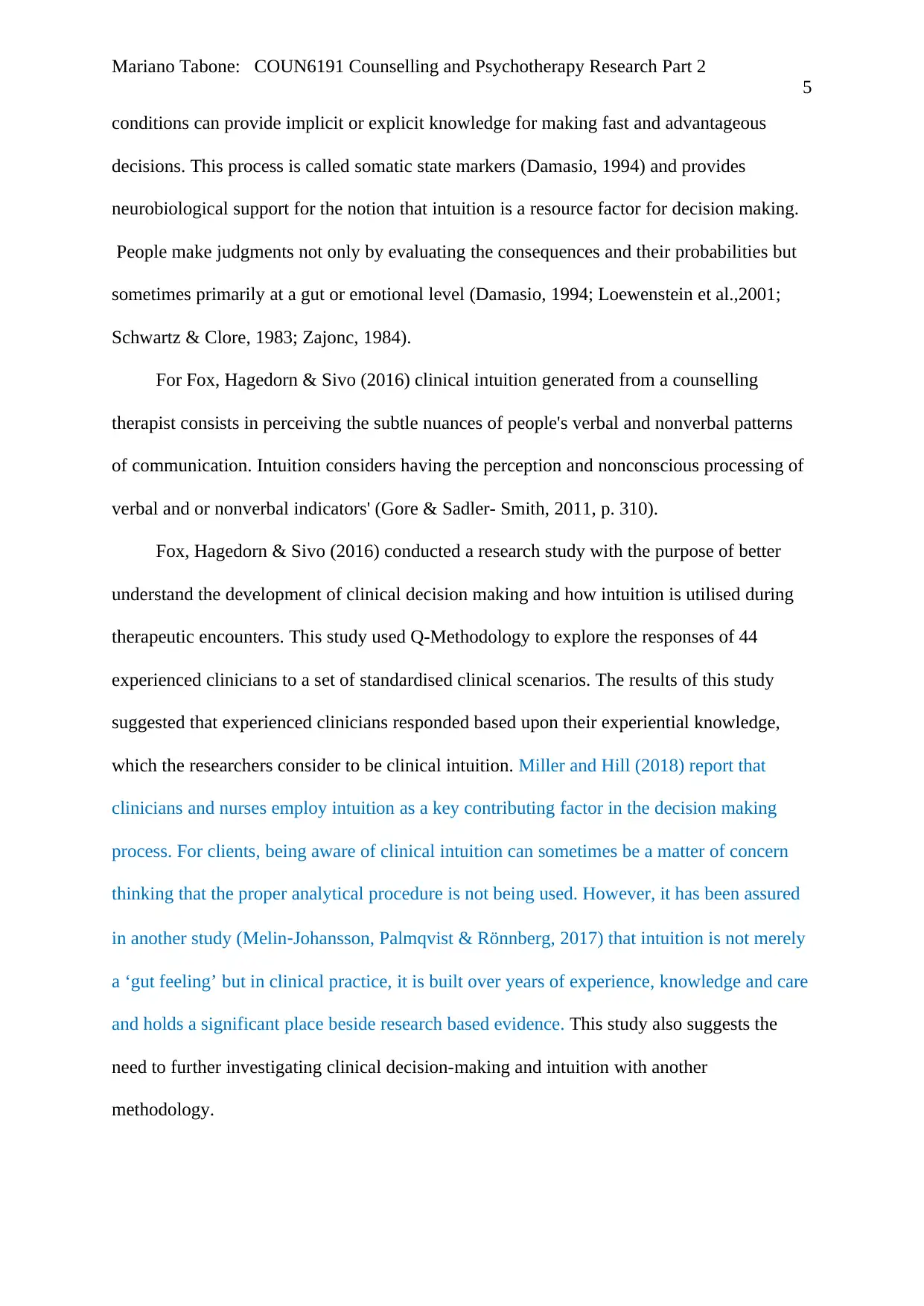
Mariano Tabone: COUN6191 Counselling and Psychotherapy Research Part 2
5
conditions can provide implicit or explicit knowledge for making fast and advantageous
decisions. This process is called somatic state markers (Damasio, 1994) and provides
neurobiological support for the notion that intuition is a resource factor for decision making.
People make judgments not only by evaluating the consequences and their probabilities but
sometimes primarily at a gut or emotional level (Damasio, 1994; Loewenstein et al.,2001;
Schwartz & Clore, 1983; Zajonc, 1984).
For Fox, Hagedorn & Sivo (2016) clinical intuition generated from a counselling
therapist consists in perceiving the subtle nuances of people's verbal and nonverbal patterns
of communication. Intuition considers having the perception and nonconscious processing of
verbal and or nonverbal indicators' (Gore & Sadler- Smith, 2011, p. 310).
Fox, Hagedorn & Sivo (2016) conducted a research study with the purpose of better
understand the development of clinical decision making and how intuition is utilised during
therapeutic encounters. This study used Q-Methodology to explore the responses of 44
experienced clinicians to a set of standardised clinical scenarios. The results of this study
suggested that experienced clinicians responded based upon their experiential knowledge,
which the researchers consider to be clinical intuition. Miller and Hill (2018) report that
clinicians and nurses employ intuition as a key contributing factor in the decision making
process. For clients, being aware of clinical intuition can sometimes be a matter of concern
thinking that the proper analytical procedure is not being used. However, it has been assured
in another study (Melin‐Johansson, Palmqvist & Rönnberg, 2017) that intuition is not merely
a ‘gut feeling’ but in clinical practice, it is built over years of experience, knowledge and care
and holds a significant place beside research based evidence. This study also suggests the
need to further investigating clinical decision-making and intuition with another
methodology.
5
conditions can provide implicit or explicit knowledge for making fast and advantageous
decisions. This process is called somatic state markers (Damasio, 1994) and provides
neurobiological support for the notion that intuition is a resource factor for decision making.
People make judgments not only by evaluating the consequences and their probabilities but
sometimes primarily at a gut or emotional level (Damasio, 1994; Loewenstein et al.,2001;
Schwartz & Clore, 1983; Zajonc, 1984).
For Fox, Hagedorn & Sivo (2016) clinical intuition generated from a counselling
therapist consists in perceiving the subtle nuances of people's verbal and nonverbal patterns
of communication. Intuition considers having the perception and nonconscious processing of
verbal and or nonverbal indicators' (Gore & Sadler- Smith, 2011, p. 310).
Fox, Hagedorn & Sivo (2016) conducted a research study with the purpose of better
understand the development of clinical decision making and how intuition is utilised during
therapeutic encounters. This study used Q-Methodology to explore the responses of 44
experienced clinicians to a set of standardised clinical scenarios. The results of this study
suggested that experienced clinicians responded based upon their experiential knowledge,
which the researchers consider to be clinical intuition. Miller and Hill (2018) report that
clinicians and nurses employ intuition as a key contributing factor in the decision making
process. For clients, being aware of clinical intuition can sometimes be a matter of concern
thinking that the proper analytical procedure is not being used. However, it has been assured
in another study (Melin‐Johansson, Palmqvist & Rönnberg, 2017) that intuition is not merely
a ‘gut feeling’ but in clinical practice, it is built over years of experience, knowledge and care
and holds a significant place beside research based evidence. This study also suggests the
need to further investigating clinical decision-making and intuition with another
methodology.
⊘ This is a preview!⊘
Do you want full access?
Subscribe today to unlock all pages.

Trusted by 1+ million students worldwide
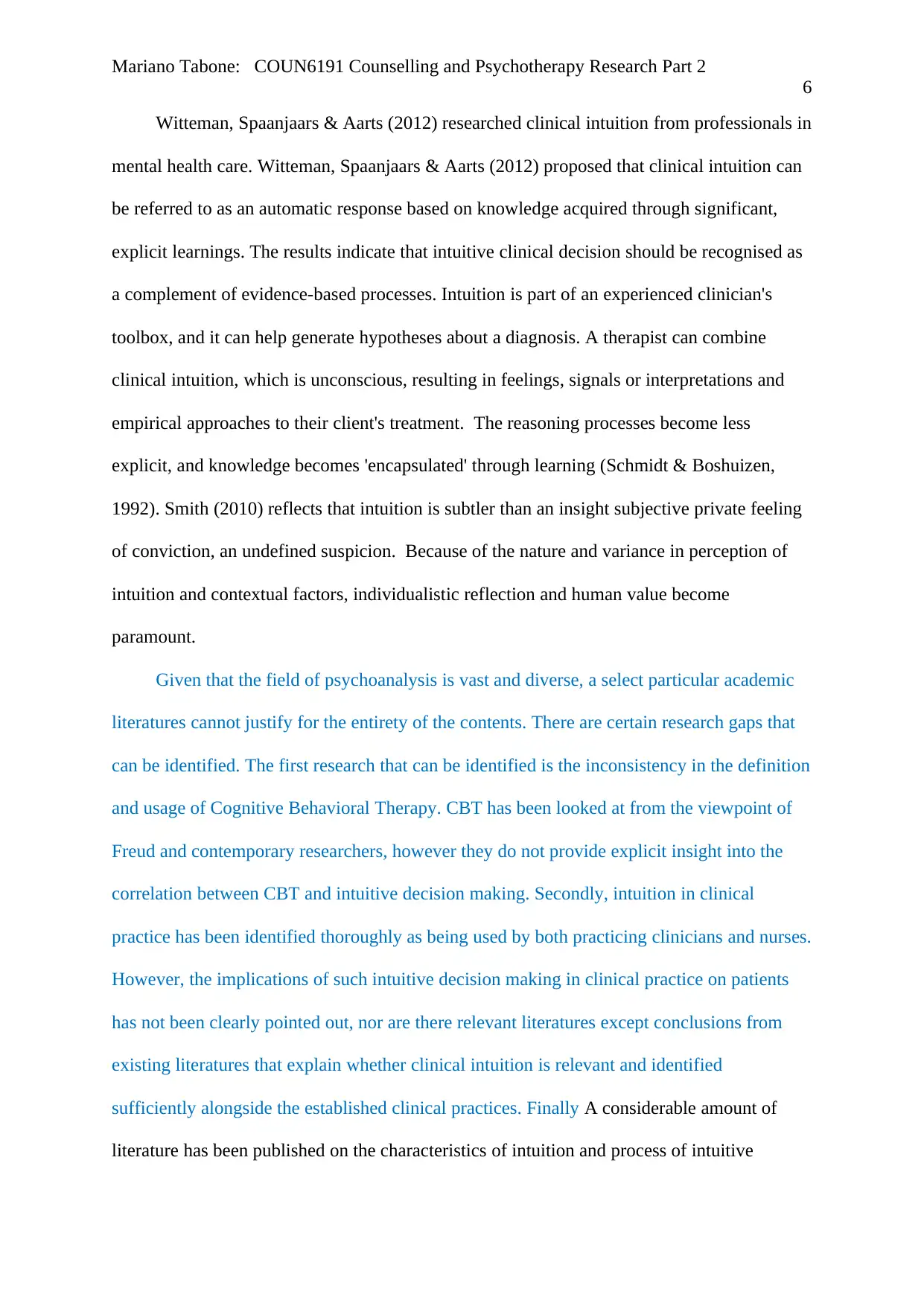
Mariano Tabone: COUN6191 Counselling and Psychotherapy Research Part 2
6
Witteman, Spaanjaars & Aarts (2012) researched clinical intuition from professionals in
mental health care. Witteman, Spaanjaars & Aarts (2012) proposed that clinical intuition can
be referred to as an automatic response based on knowledge acquired through significant,
explicit learnings. The results indicate that intuitive clinical decision should be recognised as
a complement of evidence-based processes. Intuition is part of an experienced clinician's
toolbox, and it can help generate hypotheses about a diagnosis. A therapist can combine
clinical intuition, which is unconscious, resulting in feelings, signals or interpretations and
empirical approaches to their client's treatment. The reasoning processes become less
explicit, and knowledge becomes 'encapsulated' through learning (Schmidt & Boshuizen,
1992). Smith (2010) reflects that intuition is subtler than an insight subjective private feeling
of conviction, an undefined suspicion. Because of the nature and variance in perception of
intuition and contextual factors, individualistic reflection and human value become
paramount.
Given that the field of psychoanalysis is vast and diverse, a select particular academic
literatures cannot justify for the entirety of the contents. There are certain research gaps that
can be identified. The first research that can be identified is the inconsistency in the definition
and usage of Cognitive Behavioral Therapy. CBT has been looked at from the viewpoint of
Freud and contemporary researchers, however they do not provide explicit insight into the
correlation between CBT and intuitive decision making. Secondly, intuition in clinical
practice has been identified thoroughly as being used by both practicing clinicians and nurses.
However, the implications of such intuitive decision making in clinical practice on patients
has not been clearly pointed out, nor are there relevant literatures except conclusions from
existing literatures that explain whether clinical intuition is relevant and identified
sufficiently alongside the established clinical practices. Finally A considerable amount of
literature has been published on the characteristics of intuition and process of intuitive
6
Witteman, Spaanjaars & Aarts (2012) researched clinical intuition from professionals in
mental health care. Witteman, Spaanjaars & Aarts (2012) proposed that clinical intuition can
be referred to as an automatic response based on knowledge acquired through significant,
explicit learnings. The results indicate that intuitive clinical decision should be recognised as
a complement of evidence-based processes. Intuition is part of an experienced clinician's
toolbox, and it can help generate hypotheses about a diagnosis. A therapist can combine
clinical intuition, which is unconscious, resulting in feelings, signals or interpretations and
empirical approaches to their client's treatment. The reasoning processes become less
explicit, and knowledge becomes 'encapsulated' through learning (Schmidt & Boshuizen,
1992). Smith (2010) reflects that intuition is subtler than an insight subjective private feeling
of conviction, an undefined suspicion. Because of the nature and variance in perception of
intuition and contextual factors, individualistic reflection and human value become
paramount.
Given that the field of psychoanalysis is vast and diverse, a select particular academic
literatures cannot justify for the entirety of the contents. There are certain research gaps that
can be identified. The first research that can be identified is the inconsistency in the definition
and usage of Cognitive Behavioral Therapy. CBT has been looked at from the viewpoint of
Freud and contemporary researchers, however they do not provide explicit insight into the
correlation between CBT and intuitive decision making. Secondly, intuition in clinical
practice has been identified thoroughly as being used by both practicing clinicians and nurses.
However, the implications of such intuitive decision making in clinical practice on patients
has not been clearly pointed out, nor are there relevant literatures except conclusions from
existing literatures that explain whether clinical intuition is relevant and identified
sufficiently alongside the established clinical practices. Finally A considerable amount of
literature has been published on the characteristics of intuition and process of intuitive
Paraphrase This Document
Need a fresh take? Get an instant paraphrase of this document with our AI Paraphraser
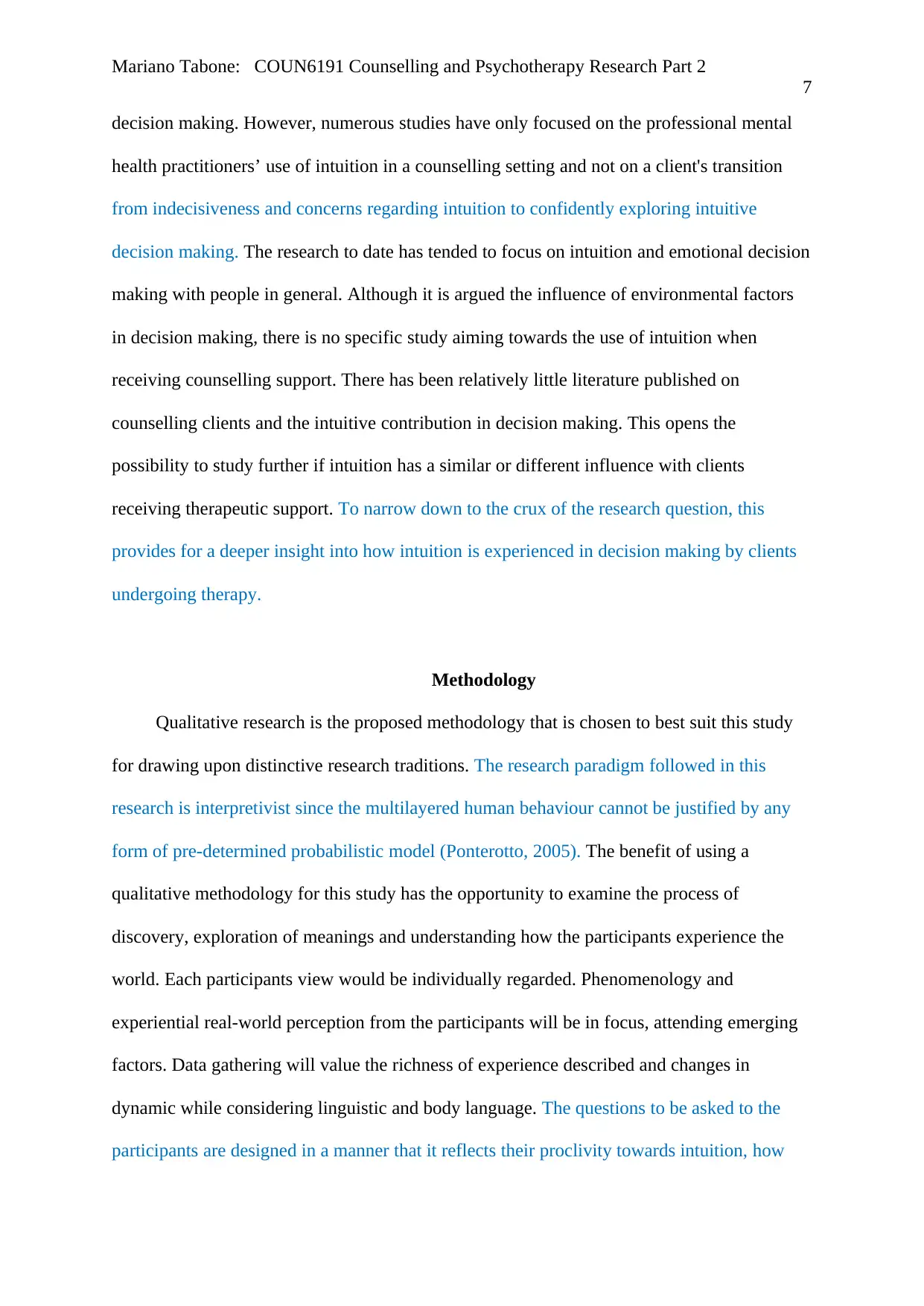
Mariano Tabone: COUN6191 Counselling and Psychotherapy Research Part 2
7
decision making. However, numerous studies have only focused on the professional mental
health practitioners’ use of intuition in a counselling setting and not on a client's transition
from indecisiveness and concerns regarding intuition to confidently exploring intuitive
decision making. The research to date has tended to focus on intuition and emotional decision
making with people in general. Although it is argued the influence of environmental factors
in decision making, there is no specific study aiming towards the use of intuition when
receiving counselling support. There has been relatively little literature published on
counselling clients and the intuitive contribution in decision making. This opens the
possibility to study further if intuition has a similar or different influence with clients
receiving therapeutic support. To narrow down to the crux of the research question, this
provides for a deeper insight into how intuition is experienced in decision making by clients
undergoing therapy.
Methodology
Qualitative research is the proposed methodology that is chosen to best suit this study
for drawing upon distinctive research traditions. The research paradigm followed in this
research is interpretivist since the multilayered human behaviour cannot be justified by any
form of pre-determined probabilistic model (Ponterotto, 2005). The benefit of using a
qualitative methodology for this study has the opportunity to examine the process of
discovery, exploration of meanings and understanding how the participants experience the
world. Each participants view would be individually regarded. Phenomenology and
experiential real-world perception from the participants will be in focus, attending emerging
factors. Data gathering will value the richness of experience described and changes in
dynamic while considering linguistic and body language. The questions to be asked to the
participants are designed in a manner that it reflects their proclivity towards intuition, how
7
decision making. However, numerous studies have only focused on the professional mental
health practitioners’ use of intuition in a counselling setting and not on a client's transition
from indecisiveness and concerns regarding intuition to confidently exploring intuitive
decision making. The research to date has tended to focus on intuition and emotional decision
making with people in general. Although it is argued the influence of environmental factors
in decision making, there is no specific study aiming towards the use of intuition when
receiving counselling support. There has been relatively little literature published on
counselling clients and the intuitive contribution in decision making. This opens the
possibility to study further if intuition has a similar or different influence with clients
receiving therapeutic support. To narrow down to the crux of the research question, this
provides for a deeper insight into how intuition is experienced in decision making by clients
undergoing therapy.
Methodology
Qualitative research is the proposed methodology that is chosen to best suit this study
for drawing upon distinctive research traditions. The research paradigm followed in this
research is interpretivist since the multilayered human behaviour cannot be justified by any
form of pre-determined probabilistic model (Ponterotto, 2005). The benefit of using a
qualitative methodology for this study has the opportunity to examine the process of
discovery, exploration of meanings and understanding how the participants experience the
world. Each participants view would be individually regarded. Phenomenology and
experiential real-world perception from the participants will be in focus, attending emerging
factors. Data gathering will value the richness of experience described and changes in
dynamic while considering linguistic and body language. The questions to be asked to the
participants are designed in a manner that it reflects their proclivity towards intuition, how
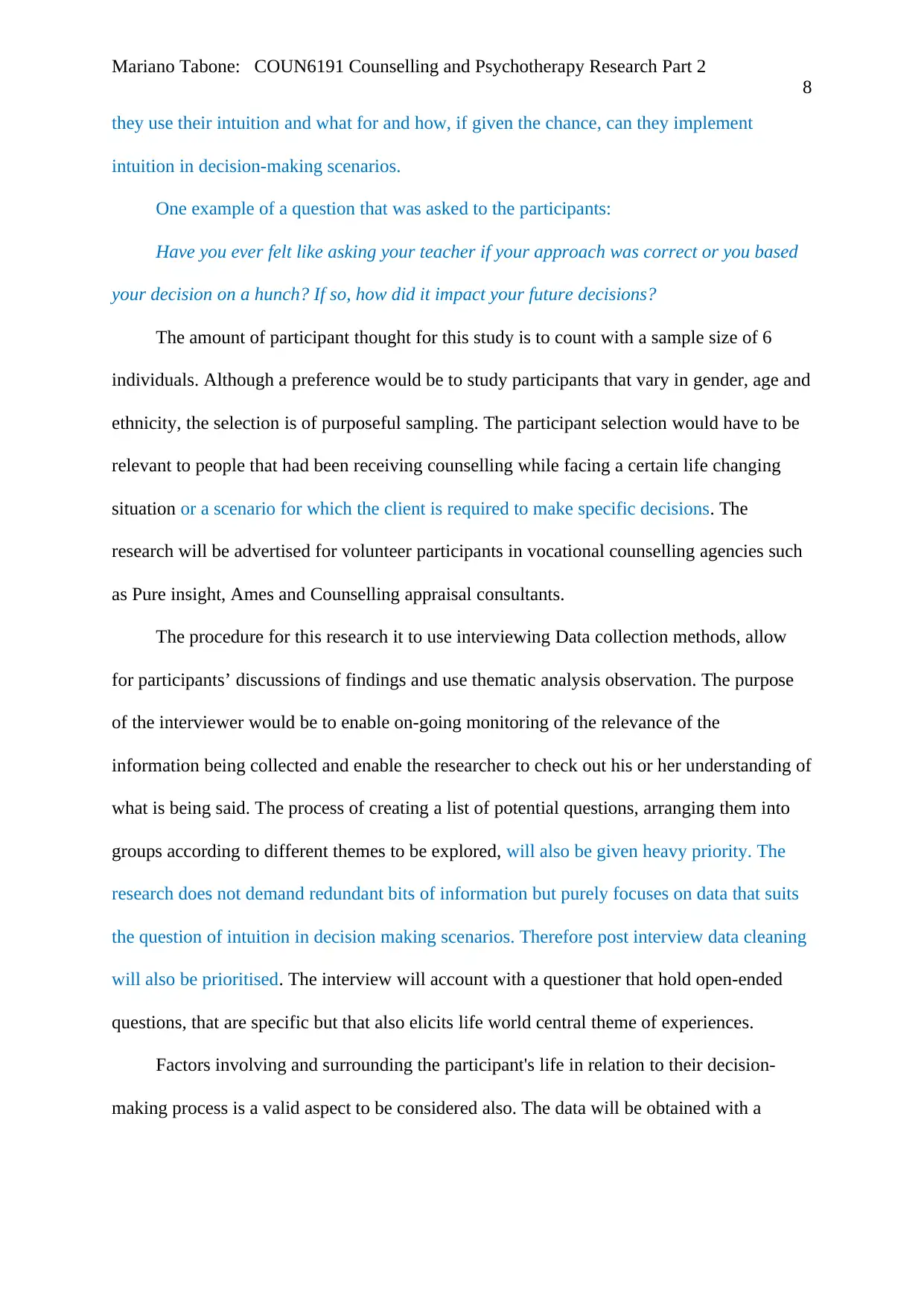
Mariano Tabone: COUN6191 Counselling and Psychotherapy Research Part 2
8
they use their intuition and what for and how, if given the chance, can they implement
intuition in decision-making scenarios.
One example of a question that was asked to the participants:
Have you ever felt like asking your teacher if your approach was correct or you based
your decision on a hunch? If so, how did it impact your future decisions?
The amount of participant thought for this study is to count with a sample size of 6
individuals. Although a preference would be to study participants that vary in gender, age and
ethnicity, the selection is of purposeful sampling. The participant selection would have to be
relevant to people that had been receiving counselling while facing a certain life changing
situation or a scenario for which the client is required to make specific decisions. The
research will be advertised for volunteer participants in vocational counselling agencies such
as Pure insight, Ames and Counselling appraisal consultants.
The procedure for this research it to use interviewing Data collection methods, allow
for participants’ discussions of findings and use thematic analysis observation. The purpose
of the interviewer would be to enable on-going monitoring of the relevance of the
information being collected and enable the researcher to check out his or her understanding of
what is being said. The process of creating a list of potential questions, arranging them into
groups according to different themes to be explored, will also be given heavy priority. The
research does not demand redundant bits of information but purely focuses on data that suits
the question of intuition in decision making scenarios. Therefore post interview data cleaning
will also be prioritised. The interview will account with a questioner that hold open-ended
questions, that are specific but that also elicits life world central theme of experiences.
Factors involving and surrounding the participant's life in relation to their decision-
making process is a valid aspect to be considered also. The data will be obtained with a
8
they use their intuition and what for and how, if given the chance, can they implement
intuition in decision-making scenarios.
One example of a question that was asked to the participants:
Have you ever felt like asking your teacher if your approach was correct or you based
your decision on a hunch? If so, how did it impact your future decisions?
The amount of participant thought for this study is to count with a sample size of 6
individuals. Although a preference would be to study participants that vary in gender, age and
ethnicity, the selection is of purposeful sampling. The participant selection would have to be
relevant to people that had been receiving counselling while facing a certain life changing
situation or a scenario for which the client is required to make specific decisions. The
research will be advertised for volunteer participants in vocational counselling agencies such
as Pure insight, Ames and Counselling appraisal consultants.
The procedure for this research it to use interviewing Data collection methods, allow
for participants’ discussions of findings and use thematic analysis observation. The purpose
of the interviewer would be to enable on-going monitoring of the relevance of the
information being collected and enable the researcher to check out his or her understanding of
what is being said. The process of creating a list of potential questions, arranging them into
groups according to different themes to be explored, will also be given heavy priority. The
research does not demand redundant bits of information but purely focuses on data that suits
the question of intuition in decision making scenarios. Therefore post interview data cleaning
will also be prioritised. The interview will account with a questioner that hold open-ended
questions, that are specific but that also elicits life world central theme of experiences.
Factors involving and surrounding the participant's life in relation to their decision-
making process is a valid aspect to be considered also. The data will be obtained with a
⊘ This is a preview!⊘
Do you want full access?
Subscribe today to unlock all pages.

Trusted by 1+ million students worldwide
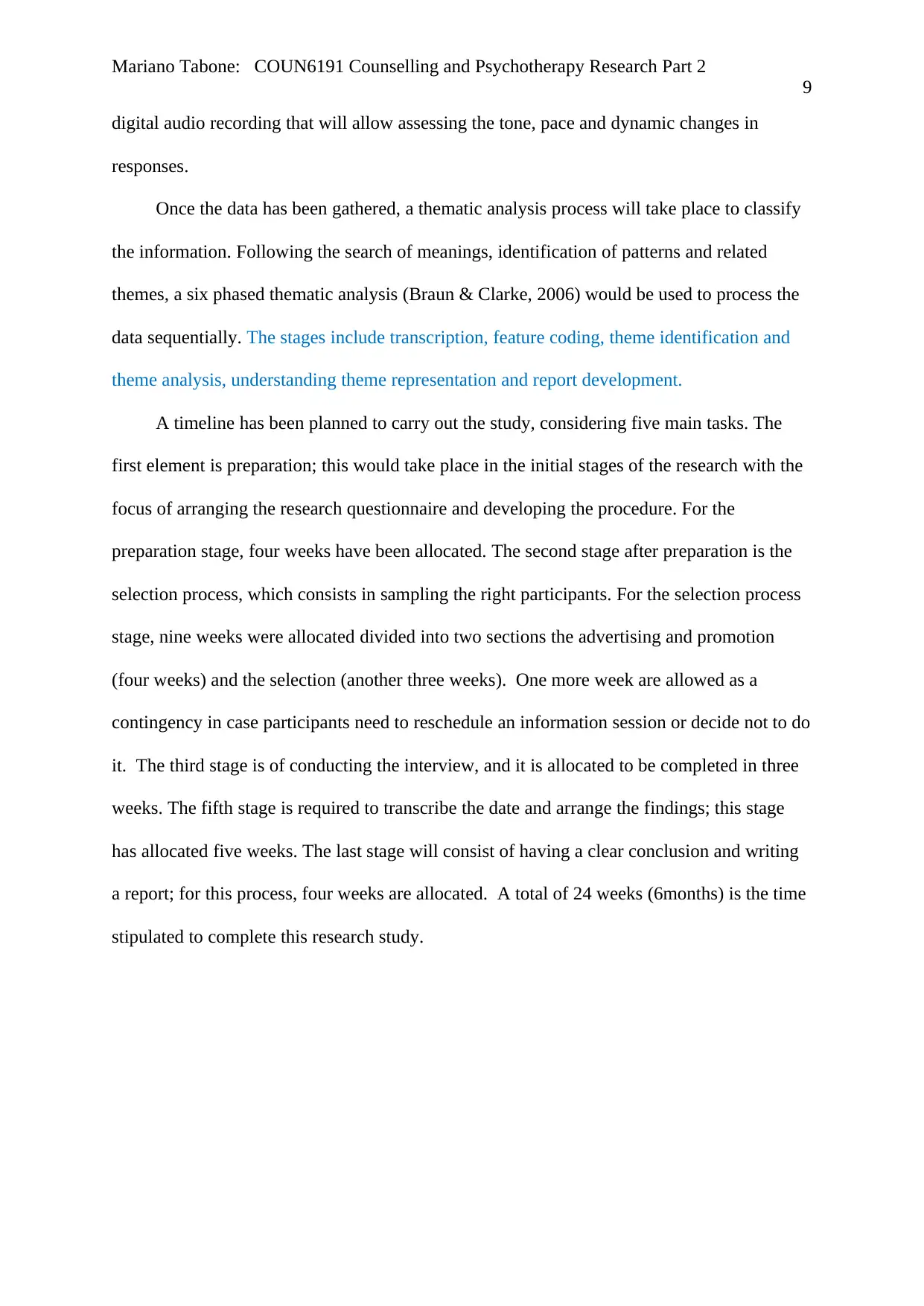
Mariano Tabone: COUN6191 Counselling and Psychotherapy Research Part 2
9
digital audio recording that will allow assessing the tone, pace and dynamic changes in
responses.
Once the data has been gathered, a thematic analysis process will take place to classify
the information. Following the search of meanings, identification of patterns and related
themes, a six phased thematic analysis (Braun & Clarke, 2006) would be used to process the
data sequentially. The stages include transcription, feature coding, theme identification and
theme analysis, understanding theme representation and report development.
A timeline has been planned to carry out the study, considering five main tasks. The
first element is preparation; this would take place in the initial stages of the research with the
focus of arranging the research questionnaire and developing the procedure. For the
preparation stage, four weeks have been allocated. The second stage after preparation is the
selection process, which consists in sampling the right participants. For the selection process
stage, nine weeks were allocated divided into two sections the advertising and promotion
(four weeks) and the selection (another three weeks). One more week are allowed as a
contingency in case participants need to reschedule an information session or decide not to do
it. The third stage is of conducting the interview, and it is allocated to be completed in three
weeks. The fifth stage is required to transcribe the date and arrange the findings; this stage
has allocated five weeks. The last stage will consist of having a clear conclusion and writing
a report; for this process, four weeks are allocated. A total of 24 weeks (6months) is the time
stipulated to complete this research study.
9
digital audio recording that will allow assessing the tone, pace and dynamic changes in
responses.
Once the data has been gathered, a thematic analysis process will take place to classify
the information. Following the search of meanings, identification of patterns and related
themes, a six phased thematic analysis (Braun & Clarke, 2006) would be used to process the
data sequentially. The stages include transcription, feature coding, theme identification and
theme analysis, understanding theme representation and report development.
A timeline has been planned to carry out the study, considering five main tasks. The
first element is preparation; this would take place in the initial stages of the research with the
focus of arranging the research questionnaire and developing the procedure. For the
preparation stage, four weeks have been allocated. The second stage after preparation is the
selection process, which consists in sampling the right participants. For the selection process
stage, nine weeks were allocated divided into two sections the advertising and promotion
(four weeks) and the selection (another three weeks). One more week are allowed as a
contingency in case participants need to reschedule an information session or decide not to do
it. The third stage is of conducting the interview, and it is allocated to be completed in three
weeks. The fifth stage is required to transcribe the date and arrange the findings; this stage
has allocated five weeks. The last stage will consist of having a clear conclusion and writing
a report; for this process, four weeks are allocated. A total of 24 weeks (6months) is the time
stipulated to complete this research study.
Paraphrase This Document
Need a fresh take? Get an instant paraphrase of this document with our AI Paraphraser
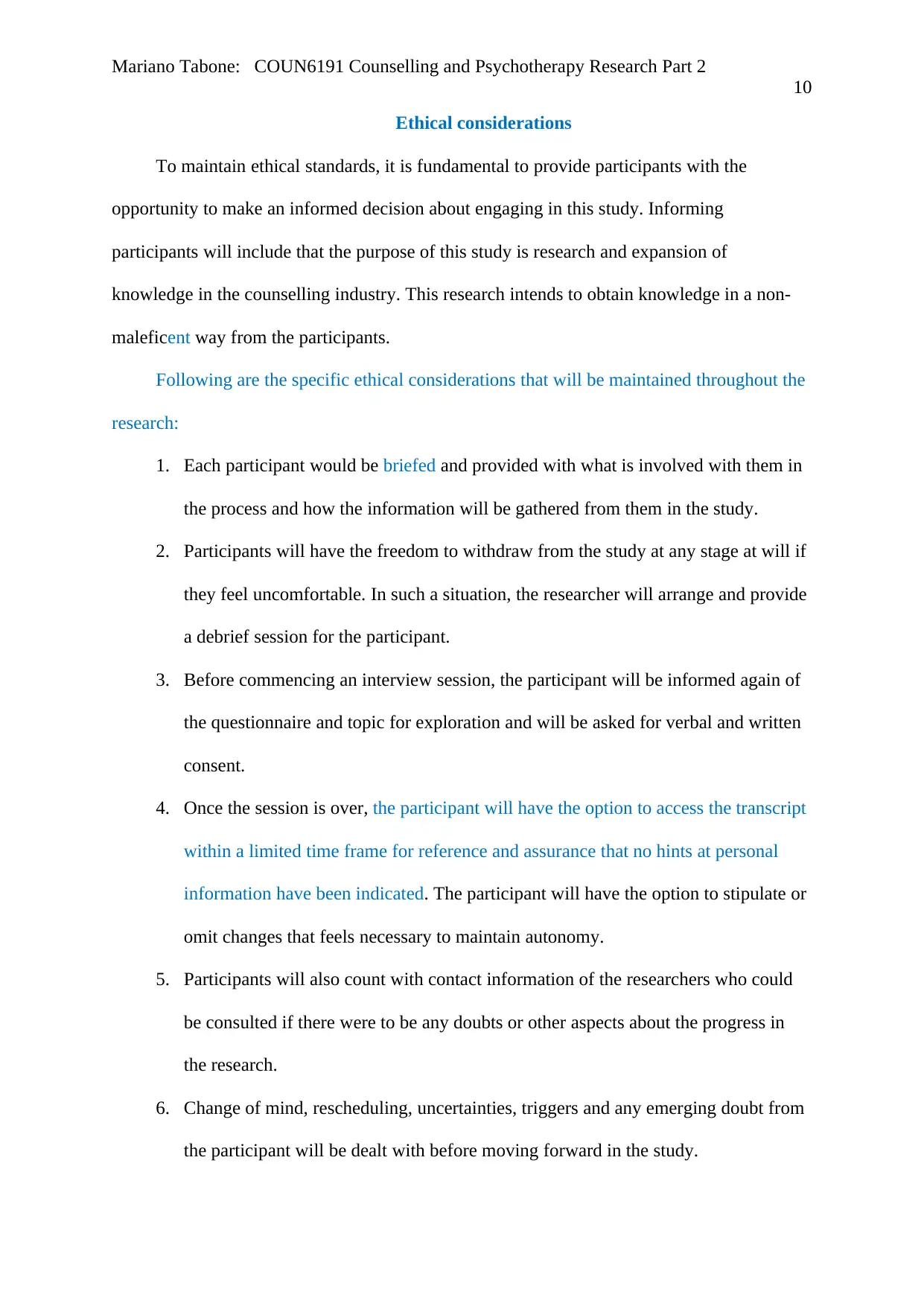
Mariano Tabone: COUN6191 Counselling and Psychotherapy Research Part 2
10
Ethical considerations
To maintain ethical standards, it is fundamental to provide participants with the
opportunity to make an informed decision about engaging in this study. Informing
participants will include that the purpose of this study is research and expansion of
knowledge in the counselling industry. This research intends to obtain knowledge in a non-
maleficent way from the participants.
Following are the specific ethical considerations that will be maintained throughout the
research:
1. Each participant would be briefed and provided with what is involved with them in
the process and how the information will be gathered from them in the study.
2. Participants will have the freedom to withdraw from the study at any stage at will if
they feel uncomfortable. In such a situation, the researcher will arrange and provide
a debrief session for the participant.
3. Before commencing an interview session, the participant will be informed again of
the questionnaire and topic for exploration and will be asked for verbal and written
consent.
4. Once the session is over, the participant will have the option to access the transcript
within a limited time frame for reference and assurance that no hints at personal
information have been indicated. The participant will have the option to stipulate or
omit changes that feels necessary to maintain autonomy.
5. Participants will also count with contact information of the researchers who could
be consulted if there were to be any doubts or other aspects about the progress in
the research.
6. Change of mind, rescheduling, uncertainties, triggers and any emerging doubt from
the participant will be dealt with before moving forward in the study.
10
Ethical considerations
To maintain ethical standards, it is fundamental to provide participants with the
opportunity to make an informed decision about engaging in this study. Informing
participants will include that the purpose of this study is research and expansion of
knowledge in the counselling industry. This research intends to obtain knowledge in a non-
maleficent way from the participants.
Following are the specific ethical considerations that will be maintained throughout the
research:
1. Each participant would be briefed and provided with what is involved with them in
the process and how the information will be gathered from them in the study.
2. Participants will have the freedom to withdraw from the study at any stage at will if
they feel uncomfortable. In such a situation, the researcher will arrange and provide
a debrief session for the participant.
3. Before commencing an interview session, the participant will be informed again of
the questionnaire and topic for exploration and will be asked for verbal and written
consent.
4. Once the session is over, the participant will have the option to access the transcript
within a limited time frame for reference and assurance that no hints at personal
information have been indicated. The participant will have the option to stipulate or
omit changes that feels necessary to maintain autonomy.
5. Participants will also count with contact information of the researchers who could
be consulted if there were to be any doubts or other aspects about the progress in
the research.
6. Change of mind, rescheduling, uncertainties, triggers and any emerging doubt from
the participant will be dealt with before moving forward in the study.
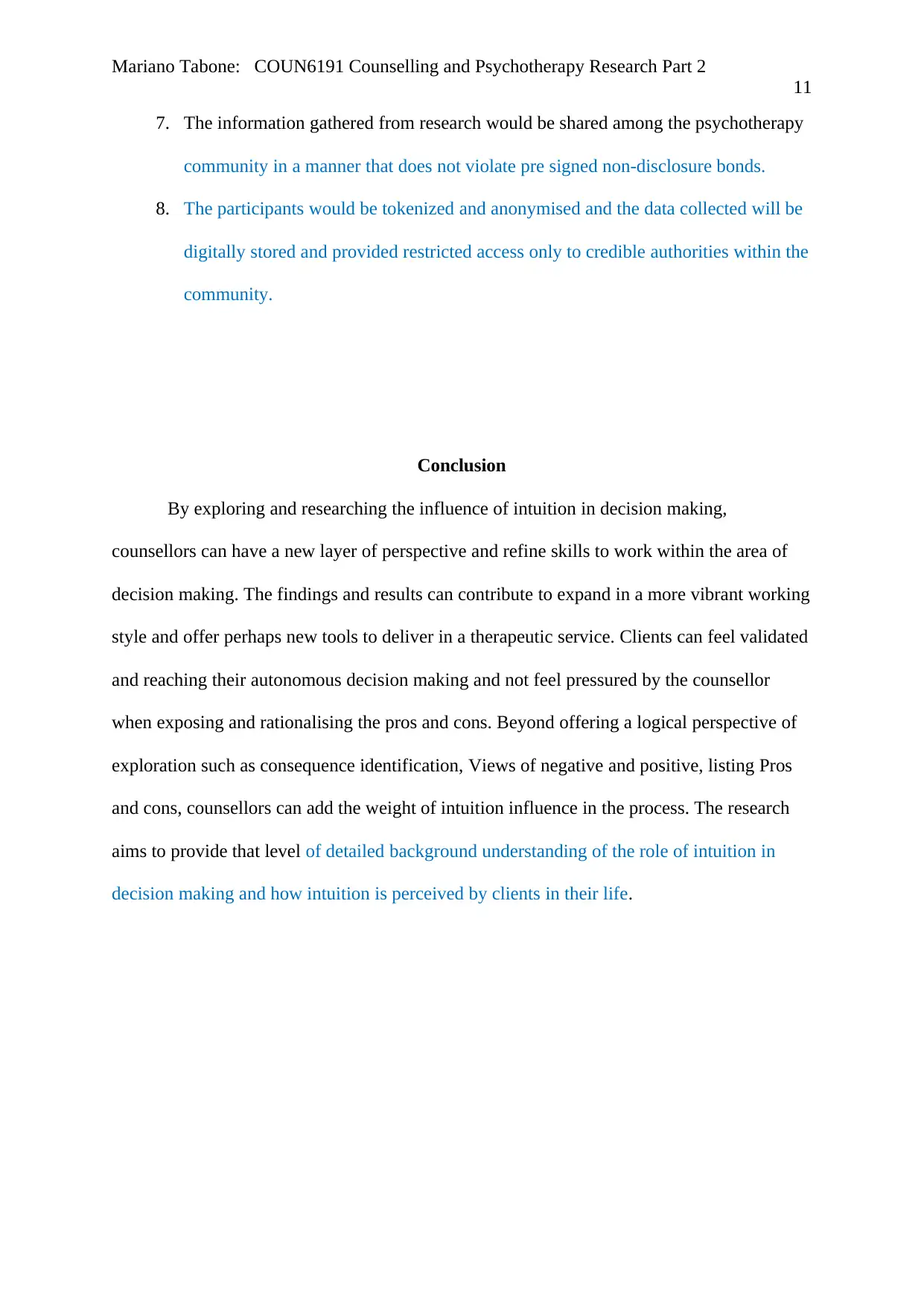
Mariano Tabone: COUN6191 Counselling and Psychotherapy Research Part 2
11
7. The information gathered from research would be shared among the psychotherapy
community in a manner that does not violate pre signed non-disclosure bonds.
8. The participants would be tokenized and anonymised and the data collected will be
digitally stored and provided restricted access only to credible authorities within the
community.
Conclusion
By exploring and researching the influence of intuition in decision making,
counsellors can have a new layer of perspective and refine skills to work within the area of
decision making. The findings and results can contribute to expand in a more vibrant working
style and offer perhaps new tools to deliver in a therapeutic service. Clients can feel validated
and reaching their autonomous decision making and not feel pressured by the counsellor
when exposing and rationalising the pros and cons. Beyond offering a logical perspective of
exploration such as consequence identification, Views of negative and positive, listing Pros
and cons, counsellors can add the weight of intuition influence in the process. The research
aims to provide that level of detailed background understanding of the role of intuition in
decision making and how intuition is perceived by clients in their life.
11
7. The information gathered from research would be shared among the psychotherapy
community in a manner that does not violate pre signed non-disclosure bonds.
8. The participants would be tokenized and anonymised and the data collected will be
digitally stored and provided restricted access only to credible authorities within the
community.
Conclusion
By exploring and researching the influence of intuition in decision making,
counsellors can have a new layer of perspective and refine skills to work within the area of
decision making. The findings and results can contribute to expand in a more vibrant working
style and offer perhaps new tools to deliver in a therapeutic service. Clients can feel validated
and reaching their autonomous decision making and not feel pressured by the counsellor
when exposing and rationalising the pros and cons. Beyond offering a logical perspective of
exploration such as consequence identification, Views of negative and positive, listing Pros
and cons, counsellors can add the weight of intuition influence in the process. The research
aims to provide that level of detailed background understanding of the role of intuition in
decision making and how intuition is perceived by clients in their life.
⊘ This is a preview!⊘
Do you want full access?
Subscribe today to unlock all pages.

Trusted by 1+ million students worldwide
1 out of 16
Related Documents
Your All-in-One AI-Powered Toolkit for Academic Success.
+13062052269
info@desklib.com
Available 24*7 on WhatsApp / Email
![[object Object]](/_next/static/media/star-bottom.7253800d.svg)
Unlock your academic potential
Copyright © 2020–2026 A2Z Services. All Rights Reserved. Developed and managed by ZUCOL.



